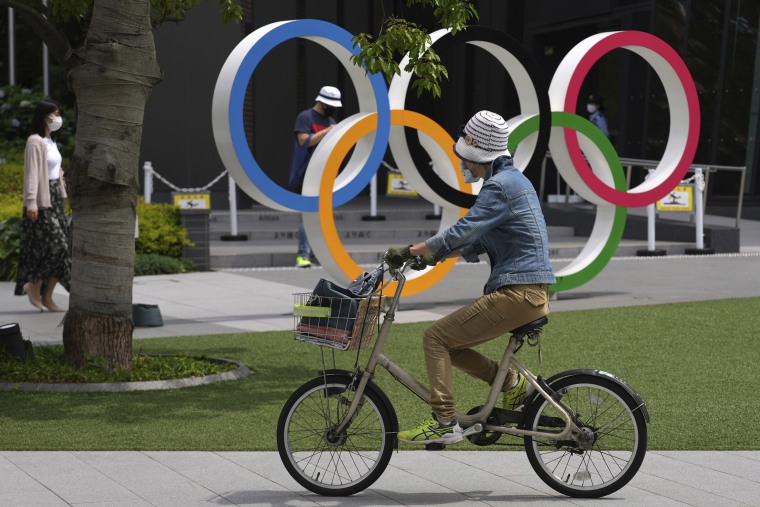Just a day after announcing that local spectators in Japan would be allowed to attend the Tokyo Olympic Games this summer despite fears around Covid-19, the president of the Tokyo Olympics Organizing Committee told NBC News that spectators could still be turned away.
The president, Seiko Hashimoto, speaking exclusively to NBC News, said Tuesday that plans to permit spectators could change if Covid-19 infections surge.
"We may potentially bring down the number of spectators, a cap on the spectators or ... no spectators," she said via a translator.
She added that games and sporting events could also be canceled once they begin if athletes test positive for the virus, although she admitted this would be a "very difficult decision" to take and was further proof of the "unprecedented" challenges faced by the Tokyo games.
NBC Universal, the parent company of NBC News, owns the U.S. media rights to the upcoming Olympics.

On Monday, Olympic officials said venues in Japan would be limited to 50 percent capacity, with up to 10,000 domestic fans able to attend events when the games open next month.
The decision was made by the five parties involved in organizing the games: The International Olympic Committee, the International Paralympic Committee, the Tokyo Olympic Committee, the Tokyo metropolitan government and the government of Japan.
An opinion poll in May found 80 percent of people in Japan thought the games should not be held during the pandemic, with some taking part in protests, but surveys this month have shown a shift in public opinion with 50 percent now opposing the games.
The decision to go ahead has also come under fire from some Japanese health experts, fearful of a surge in Covid-19 cases or the birth of a new variant as a result of the games.
Over the weekend, a member of Uganda's Olympic team tested positive for the coronavirus and was barred from entering Japan in the first detected infection among arriving athletes.
Download the NBC News app for breaking news and politics
Hashimoto, a former Olympic speed skater and cyclist, was chosen as president of the Tokyo organizing committee in February, replacing Yoshiro Mori who resigned after setting off a furor with sexist remarks.
Hashimoto competed in seven Summer and Winter Olympics and is now at the helm of one of the world's biggest sporting events. She said she understood the postponement of the games from last year and the ongoing restrictions were "emotionally tough" for athletes, but that an extra year of preparation could also be a boon.
She said she hoped the opening ceremony would be "uplifting and glorious" and bring a sense of joy to the games, marred by the pandemic.
"I want the opening ceremony to shed a very warm light to the heart of everyone who is watching," she said.
In addition to limits on the number of spectators, the organizers have also said that masks must be worn at all times in the games' venues, and that shouting and speaking loudly will be prohibited.
Tokyo and other areas are currently under "quasi-emergency" status until July 11. This replaced a tougher full state of emergency that was in effect until last weekend. Japan has reported 786,566 cases and 14,408 deaths from the coronavirus, according to data from Johns Hopkins University on Tuesday.
The Olympic Games, which were originally scheduled to take place in 2020, were pushed off to this summer and are set to open July 23.
Fans from abroad were barred in March from traveling to Japan for the games because of the pandemic. However, organizers say between 3.6 and 3.7 million tickets have been sold to Japanese residents so far.
"I feel very responsible because we need to be very solidly prepared for the games," Hashimoto said. "But at the same time I'm feeling the excitement," she added.
CLARIFICATION: (June 23, 2021, 08:15 a.m. ET) A previous version of this article stated that public support in Japan for cancelling the games was 80 percent. A more recent opinion poll put this figure at 50 percent.
